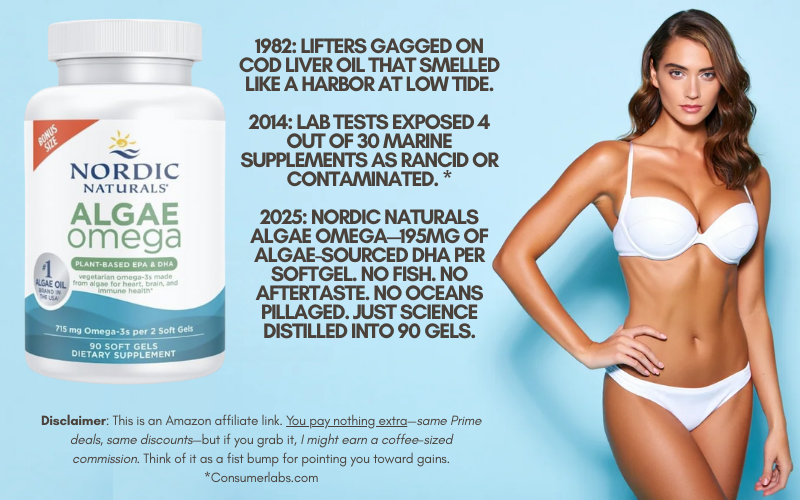You typed “Algal Oil” into Google because you’re looking for real answers—maybe you’re tired of burping up fish oil, or you’re wondering if this green stuff actually does anything. Let’s cut through the sludge:
👉 Algal oil is a plant-based omega-3 supplement derived from microalgae, offering a clean, sustainable alternative to fish oil that still delivers high levels of DHA (docosahexaenoic acid)—the same fatty acid your brain and heart crave.
It’s not hype. It’s strategy. You’re here because you want clarity, not confusion.
“Algal oil is essentially skipping the middleman. Fish get their omega-3s from algae—so why not go straight to the source?”
—Eugene Thong, CSCS
Why Some Guys Are Switching to Algal Oil
You lift. You push through stress. You don’t back down. But what you might not know is this: chronic inflammation can quietly wreck your training gains, jack your immune response, and slow down recovery.
Algal oil helps fight back.
It delivers DHA and often EPA, both crucial omega-3 fatty acids that reduce inflammation, support cardiovascular health, and aid mental clarity.
“Whether it’s post-workout inflammation or general wear-and-tear, omega-3s play a big role in how quickly you bounce back.”
—Charles Damiano, B.S. Clinical Nutrition
Compare Algal Oil to Other Omega-3 Sources
| Source | Contains DHA? | EPA Level | Sustainable? | Common Issues |
|---|---|---|---|---|
| Fish Oil | ✅ | ✅ High | ❌ Overfishing | Fishy burps, heavy metals |
| Krill Oil | ✅ | ✅ Moderate | ❓ Questionable | Pricey, shellfish allergy risk |
| Calamari Oil | ✅ | ✅ Moderate | ❌ Bycatch risk | Not vegan, limited sourcing |
| Green-Lipped Mussel | ✅ | ✅ Low | ❌ Limited data | Shellfish-based, niche effects |
| Algal Oil | ✅ High | ✅ (varies) | ✅ 100% | Slight taste in softgels |
The Science: Why DHA Is a Non-Negotiable
DHA makes up 30% of your brain’s fatty acids. During infant development, it’s essential. After birth? Still critical—for mental health, immune function, and even neurodegenerative disorder prevention.
- Cannot take fish oil? Algal oil offers the same bioavailable DHA.
- Nursing moms can transmit it through breast milk.
- Even infant formulas now contain algal DHA—a nod to its power.
What It Helps With (Based on Biochemistry, Not Buzzwords)
- ✅ Reduces systemic inflammation
- ✅ Supports cardiovascular function
- ✅ Improves cognitive function and memory
- ✅ Supports immune response during infection recovery
- ✅ May aid in reducing risk factors for autoimmune diseases
It’s not magic, it’s molecular.
How Algal Oil Is Made (and Why That Matters)
The origin story of algal oil is part NASA, part natural innovation. Back in the 1980s, NASA researched microalgae to produce food and oxygen for astronauts in space. Turns out, these microalgae were loaded with DHA.
Today, companies like DSM-Firmenich lead the way in producing high-quality algal oils via fermentation, not extraction. This makes it:
- 🌱 Plant-based
- 🧪 Free of ocean pollutants
- 🔁 Eco-friendly
Forms and Dosage Options
You’ll typically find algal oil in:
- Vegan softgels
- Liquid drops
- Powdered blend (rare)
Typical dosage:
- 🧠 For brain health: 250–500 mg DHA/day
- ❤️ For heart health: Up to 1,000 mg DHA+EPA/day
Checklist Before You Buy
- 🔍 Look for brands with 3rd-party testing (NSF, ConsumerLab)
- 🐟 Ensure it’s fish-free if veganism is your priority
- 🌿 Check for EPA inclusion if targeting inflammation
- 🧬 Verify natural extraction (not chemically processed)
Who Should Consider Algal Oil?
- Men aged 25–55 wanting to avoid fish oil
- Those managing autoimmune or inflammatory conditions
- Lifters seeking better post-workout recovery
- Dads looking to support family health—from infants to partners
- Anyone seeking a sustainable alternative to marine oil sources
Takeaway: Algal Oil Isn’t Trendy—It’s Tactical
When your health strategy needs clarity, algal oil delivers. It’s rooted in science, not sales copy. It offers a clear path to getting your omega-3s, minus the ecological baggage and digestive side effects of fish-based options.
It’s the grown man’s move: Smart. Sustainable. Strategically sound.
Bonus Q&A: Let’s Clear the Murky Water
Q: Is algal oil the same as omega-3 supplements?
A: Algal oil is a type of omega-3 supplement, specifically rich in DHA and sometimes EPA, depending on formulation. It’s 100% plant-based, unlike fish, krill, or mussel sources.
Q: Can algal oil help fight chronic inflammation?
A: Yes. It helps regulate your body’s immune response and supports recovery from injuries, infections, and conditions that become chronic, including gastrointestinal and neurodegenerative diseases.
Q: What makes it better than prescription omega-3s like Vascepa (icosapent ethyl)?
A: Algal oil is not a drug. It’s a natural, over-the-counter alternative that doesn’t require FDA approval but can complement your doctor’s advice. It’s not better—just different in purpose.
Q: Is this stuff safe for long-term use?
A: Absolutely. There are no known long-term adverse effects, and recent lab tests confirm its purity—unlike some fish-based products which failed quality checks.
Ready to upgrade from “just okay” fish oil to a cleaner, sharper omega-3 source?
Let’s get algal.

